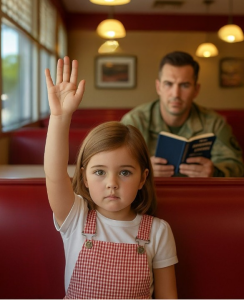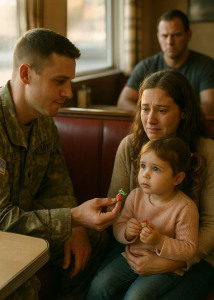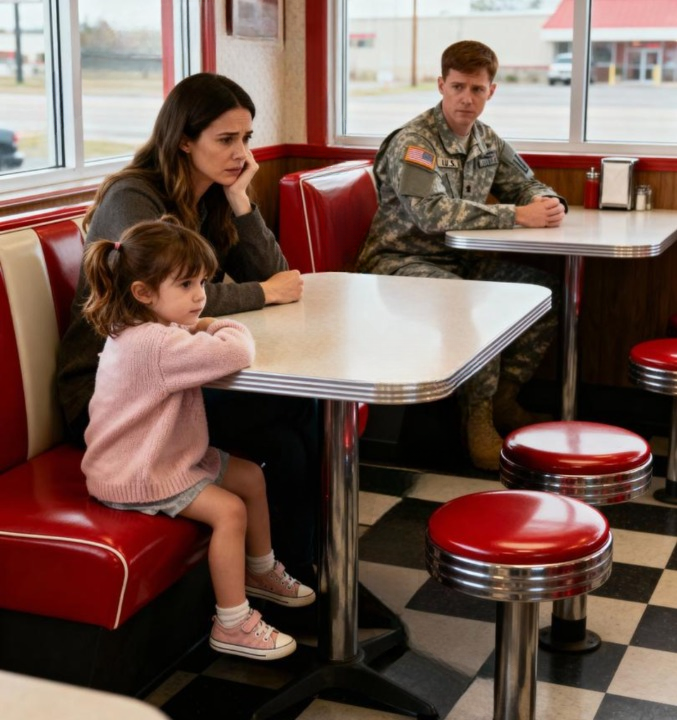The little diner sat quietly on the side of a worn highway, a humble establishment that most travelers would pass without a second glance. Its faded red stools, scarred from years of use, lined the counter in neat but slightly crooked rows. The air carried the warm, greasy aroma of frying bacon and eggs, mixed with the faint scent of fresh coffee brewing in the back. In the corner, an old jukebox hummed softly, playing a gentle, almost nostalgic melody. The music wasn’t loud or intrusive—it was just there, blending into the background like a familiar friend.
It was the kind of place that didn’t seek attention, and yet, in its quiet simplicity, there was a certain warmth. The kind that made people feel like they belonged, even if only for a moment.
Sergeant Michael Harris, a man whose life had been defined by duty and discipline, had chosen the diner almost at random. He was home on leave after a long deployment overseas, craving a moment of peace—a brief reprieve from the chaos of the military and the weight of responsibilities that never seemed to end. The noise of the city, the constant movement and demands of civilian life, could wait. For now, he just wanted a hot cup of coffee, a slice of pie, and a booth where he could sit quietly, unobserved.
He settled into a seat near the window, stirring sugar into his coffee as his eyes wandered. The glass reflected the muted sunlight of the late afternoon, casting soft patterns across his face. For months, Michael had been accustomed to staring down danger, scanning streets and villages for threats he had trained his eyes to see. But here, in this quiet diner, he allowed himself the rare luxury of calm.

His gaze drifted across the room, sweeping over the few patrons scattered in booths and at the counter. Most were engrossed in their meals, lost in thought, or quietly talking to companions. Then, something—or rather someone—caught his attention.
In a far corner sat a young woman with a small child, no older than three. The child’s tiny pink sneakers swung back and forth beneath the table, catching Michael’s eye with a rhythm that seemed both innocent and deliberate. The woman’s smile looked carefully placed, almost too wide, too tense to be natural. Every so often, her eyes darted nervously toward the man sitting beside her—a man whose presence radiated unease rather than comfort. His broad shoulders were tense, and his hand gripped the edge of the table with a force that seemed unnatural in such a peaceful setting.
Michael’s instincts, honed from years in the military, immediately sharpened. He had seen similar expressions and movements in villages across distant lands: smiles meant to hide fear, glances loaded with silent messages, bodies tensed in response to invisible threats. He studied the trio carefully, noting every subtle movement.
Then his eyes settled on the little girl.
The child sat quietly, hands folded in her lap, her hair tied into uneven pigtails. She stared at her hands for a long, deliberate moment, before lifting one tiny palm. Slowly, almost cautiously, she curled her fingers in and out, thumb tucked across her palm.
Michael froze. The gesture was unmistakable.
It was a silent S.O.S., a subtle cry for help, taught in schools and safety programs—a way for a child to signal distress without speaking a word.
A wave of urgency hit him. He could not confront the man directly; he had no concrete proof. Acting hastily could escalate the situation, putting the child in immediate danger. His military training took over, reminding him to remain calm, observe carefully, and plan a subtle intervention.
Reaching into his pocket, Michael pulled out a piece of hard candy he had grabbed at the register. With the casual air of someone passing by, he walked toward the child.
“Hey there, kiddo,” he said softly, keeping his tone light and friendly. “I think you dropped this earlier.”
The little girl’s eyes widened, a flicker of hope crossing her face. She hesitated, then carefully took the candy from his hand. Michael crouched down, meeting her at eye level, keeping his movements slow and non-threatening.

“It’s sweet,” he murmured. “Kind of like a little secret.”
The diner seemed to hold its breath. The man at the table stiffened, his jaw tightening, his eyes narrowing in suspicion.
“She doesn’t need candy,” he snapped, his voice sharp, his tone controlling.
Michael kept his posture relaxed, his face calm, though his mind raced. “No harm done,” he said with measured politeness. “Just trying to make a little one’s day.”
The woman’s eyes flickered toward him, almost imperceptibly, a silent plea threading through her glance. Michael acknowledged it quietly and returned to his booth, heart pounding. Under the table, he quickly typed a discreet message to the local sheriff’s department, alerting them to a potential situation without drawing attention.
Minutes stretched agonizingly. Michael watched the little girl unwrap her candy, holding it in her small hands as if it were a lifeline, her grip tight with both fear and hope.
Finally, the jingle of the diner’s door announced the arrival of two deputies. Their uniforms were crisp, their presence calm but authoritative. They scanned the room, and Michael subtly nodded toward the far booth.
“Afternoon,” one deputy greeted the man, approaching with a firm but polite tone. “Mind if we have a quick word?”
The man stiffened, defensive. “About what?”
The woman’s hands shook slightly over her coffee cup, her breathing shallow. The little girl sat frozen, clutching her candy tightly. Michael exhaled slowly, muscles coiled like springs, ready for any sudden movement.
“Sir,” the deputy continued, voice steady, “we’ve received a report regarding a possible situation. Could you step outside with us for a moment?”
Despite protests, the deputies’ calm authority left no room for argument. As they led the man out, the woman finally released the tension she had been holding, letting tears stream freely. The little girl, still clutching the candy wrapper, slid from the booth and ran to Michael, burying her tiny face against his knee.
“It’s okay now,” Michael murmured, resting a hand gently on her back. “You’re safe.”
Later, the deputies confirmed Michael’s worst fears: the man had a long history of violence, and the woman had been attempting to escape with her daughter but had lacked the courage until now. The child’s silent hand signal had sparked the chain of events that ultimately ensured their safety.
As the woman was escorted to safety, she approached Michael, her hands still trembling. “I don’t know how to thank you,” she whispered.
Michael shook his head. “Don’t thank me. Thank your daughter. She’s the real hero.”
The mother looked down at her child, who still clutched the candy wrapper, and for the first time that day, allowed herself a genuine, unguarded smile.
Weeks passed, and Michael returned to his duties, but the memory of the diner lingered. The tiny pink sneakers swinging beneath the table, the subtle curl of a hand signaling distress, the courage of a three-year-old girl—these images were etched in his mind.
That quiet roadside diner had witnessed an extraordinary act of bravery, one that went unnoticed by most but changed lives forever.
Reflections on Courage and Small Gestures
Michael often thought about that day, about the subtle signals that could so easily go unnoticed. A small act—a piece of candy, a gentle smile, a watchful eye—had become the difference between fear and freedom.
This story is a reminder that courage comes in many forms. Sometimes it is loud and visible, other times quiet and nearly invisible. The bravery of the little girl lay in a simple, silent gesture, and the courage of a stranger in his choice to notice it.
Everyday actions, attentiveness to the world around us, and the willingness to act—carefully, thoughtfully—can ripple outward, saving lives and altering destinies. In the grand narrative of human experience, it is often these seemingly small moments that hold the most profound impact.
